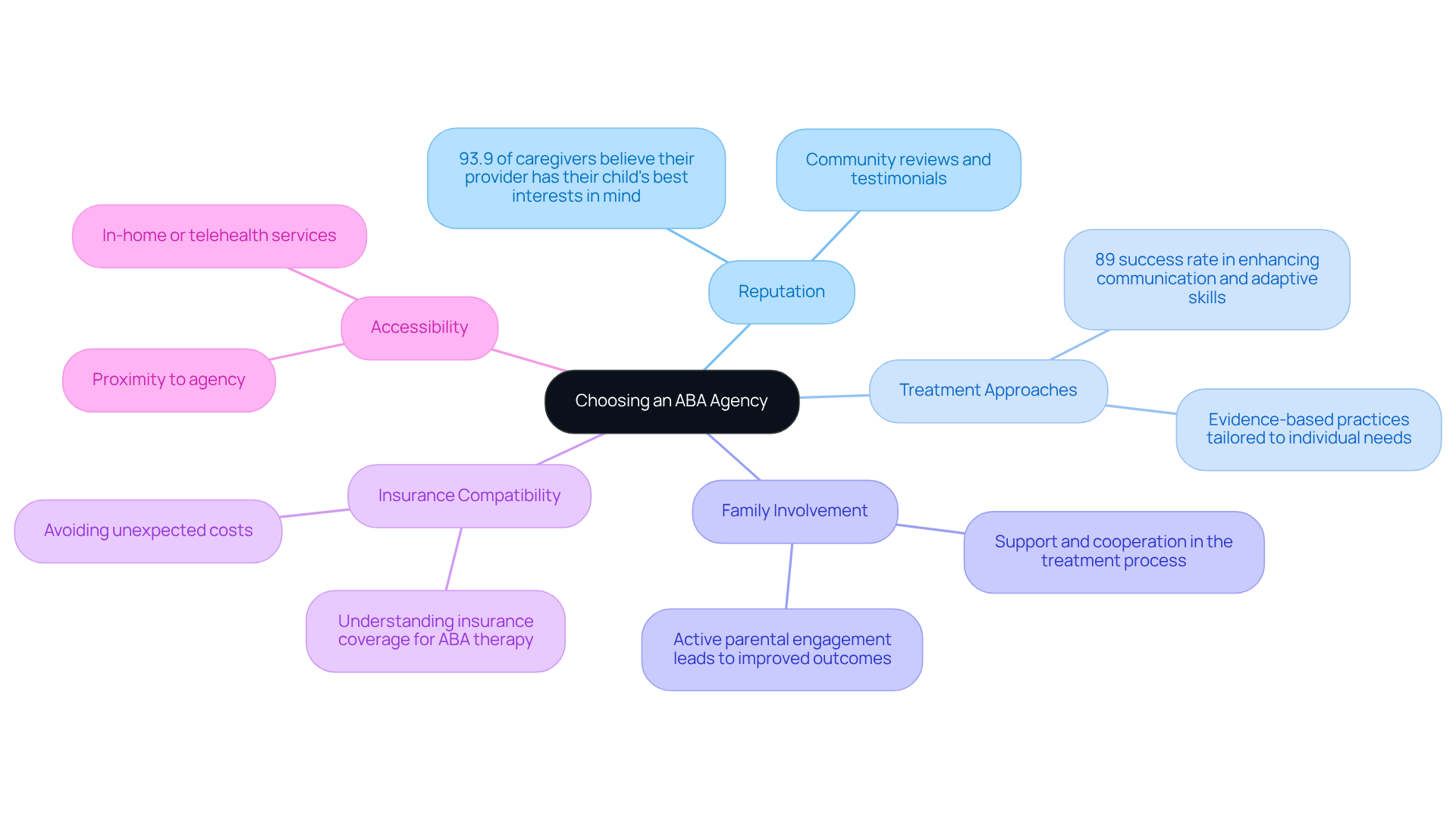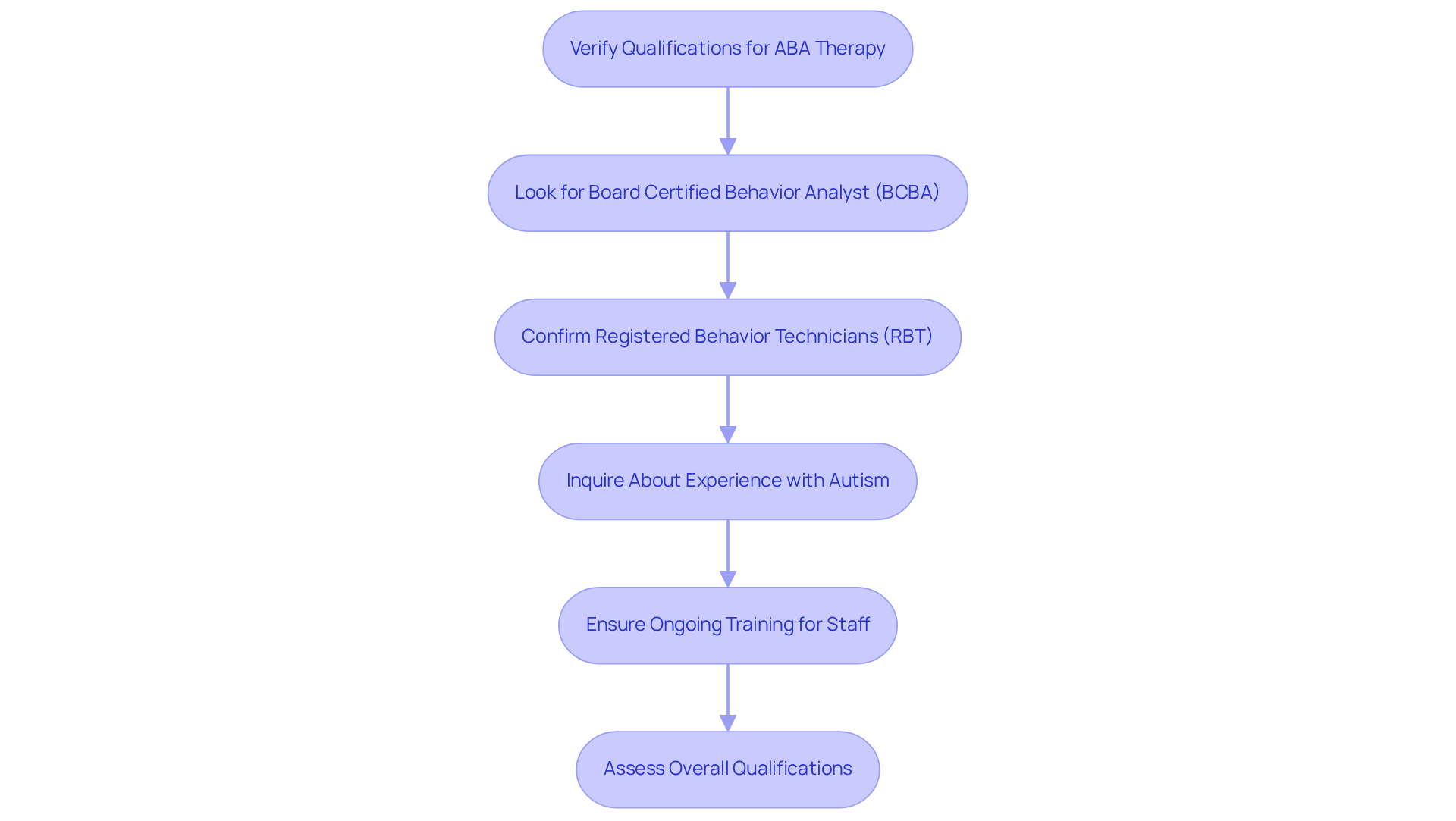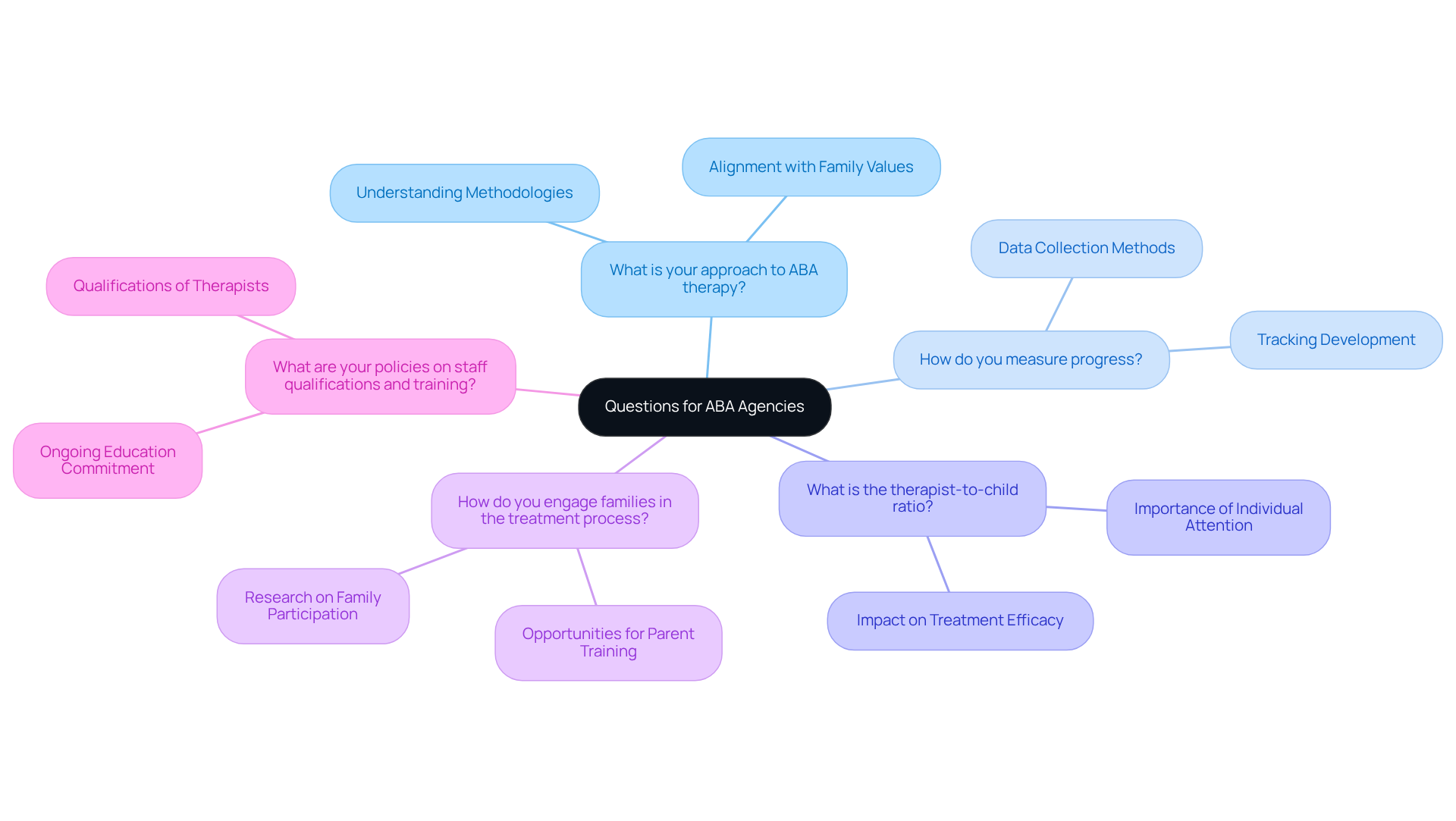Overview
Finding the right ABA agency for your child can be a daunting task, but it doesn’t have to be. This article outlines four essential steps to guide you through the process:
- Understanding ABA therapy
- Evaluating options based on key criteria
- Verifying professionals' qualifications
- Engaging with agencies by asking essential questions
By following this comprehensive approach, you can empower yourself with the knowledge and tools needed to select an agency that best meets your child's unique needs. This ensures that your child receives effective and personalized ABA therapy, tailored just for them.
Introduction
Choosing the right ABA agency can feel overwhelming for parents as they navigate the complexities of finding the best support for their child's unique needs. With the increasing demand for effective Applied Behavior Analysis therapy, it is crucial to understand the essential steps for evaluating potential agencies.
What factors should parents prioritize to ensure they select a provider that not only meets their expectations but also fosters meaningful progress in their child's development? This guide will explore the key criteria for finding the right ABA agencies nearby, empowering families to make informed decisions on this important journey.
Understand Applied Behavior Analysis (ABA) Therapy
Applied Behavior Analysis (ABA) intervention is a scientifically validated method designed to enhance specific behaviors and skills in individuals with autism and other developmental disorders. This approach emphasizes understanding the dynamics of behavior and the various factors that influence them. Let’s explore the core components of ABA together:
- Assessment: A thorough evaluation process that identifies a child's strengths and areas needing improvement. This step is essential, as successful treatment starts with a comprehensive understanding of the individual’s unique profile. Research indicates that early and accurate assessments can significantly enhance treatment outcomes. As Julian Hannush, a staff writer, beautifully states, "Selecting the appropriate treatment for an individual with autism starts with a thorough evaluation that offers a complete perspective of the person's strengths, weaknesses, and specific objectives."
- Intervention: The implementation of customized strategies aimed at promoting positive behaviors while minimizing challenging ones. Customized interventions are crucial, as they meet the unique requirements of each individual, leading to more effective outcomes.
- Data Collection: Continuous monitoring of progress through systematic data collection. This practice not only informs necessary adjustments to treatment plans but also provides measurable evidence of improvement, which is vital for both parents and therapists alike.
Recent studies have shown that ABA interventions can lead to significant improvements in communication, social skills, and adaptive behaviors. For instance, youngsters who start treatment early often show remarkable improvement within six months, with success rates surpassing 89%. Moreover, over 89% of studies indicate substantial advancements in youth undergoing ABA therapy. The demand for certified ABA therapists has surged by 5,852% from 2010 to 2021, reflecting the growing need for these vital services. By understanding these basics, parents can more effectively navigate the complexities of choosing suitable aba agencies near me that meet their child’s needs. Remember, you are not alone in this journey; seeking the right support can make all the difference.
Evaluate Your Options: Key Criteria for Choosing an ABA Agency
Selecting the right ABA agency for your child is a heartfelt journey, and it’s crucial to evaluate several key criteria to ensure the best fit for their unique needs:
- Reputation: Take the time to explore the agency's standing within your community. Look for reviews and testimonials from other parents. A survey suggested that 93.9% of caregivers feel their ABA provider genuinely has their young one's best interests at heart. A strong reputation often reflects the quality of care and positive outcomes that can make a real difference.
- Treatment Approaches: It’s essential to confirm that the organization utilizes evidence-based practices tailored specifically to your child's needs. According to ASD Media, ABA treatment is recognized for its effectiveness, with studies indicating an impressive success rate of over 89% in enhancing communication and adaptive skills.
- Family Involvement: A trustworthy organization truly values family engagement in the treatment process, fostering cooperation and support. Research shows that when parents are actively involved, it can lead to improved results in ABA programs, significantly boosting the overall efficacy of the treatment.
- Insurance Compatibility: Make sure the organization accepts your insurance plan to avoid unexpected costs. Understanding your insurance coverage for ABA support is crucial for your financial planning and for accessing the essential services your child deserves.
When considering location and accessibility, think about the agency's proximity and whether they offer in-home or telehealth services, particularly if you are looking for aba agencies near me. Accessibility can greatly influence the consistency of treatment, which is vital for achieving meaningful improvements in your child's development.
By thoughtfully assessing these factors, you can make informed choices that best support your child's growth and well-being. Your dedication to finding the right resources is a powerful step towards nurturing their potential.

Verify Qualifications: Assessing Professionals in ABA Therapy
To ensure your child receives high-quality ABA therapy, it’s essential to verify the qualifications of the professionals involved. First and foremost, look for a Board Certified Behavior Analyst (BCBA). Therapists certified by the Behavior Analyst Certification Board have met rigorous educational and training standards. As of 2023, there are approximately 30,000 BCBAs in the U.S., reflecting a robust workforce dedicated to effective behavioral interventions. With a projected job growth rate of 22% for BCBAs by 2031, this field is both stable and expanding.
Next, confirm that direct care staff are Registered Behavior Technicians (RBT). RBTs have completed specific training and supervision, playing a vital role in implementing ABA strategies. Their presence is crucial for delivering consistent and effective therapy. The average salary for RBTs is around $34,397, highlighting the economic viability of pursuing this meaningful career.
Inquire about the professional's experience working with individuals on the autism spectrum. Their familiarity with various ABA techniques is key. Experienced professionals are more likely to adapt interventions to meet individual needs, which enhances therapeutic outcomes.
It’s also important to ensure that the organization provides ongoing training for its staff. Continuous education is vital for staying updated on best practices. Nearly 94% of BCBAs report job satisfaction, which reflects a motivated and knowledgeable workforce.
By confirming these qualifications, you can feel assured in the skills of the experts collaborating with your child. This ultimately leads to more favorable outcomes in ABA treatment. Remember, you are not alone in this journey; seeking the right support can make all the difference.

Engage and Inquire: Essential Questions to Ask ABA Agencies
When interviewing ABA agencies, it's essential to ask the following questions to ensure the best fit for your child's needs:
-
What is your approach to ABA therapy?: Understanding the specific methodologies and techniques employed by the agency is crucial. Knowing their method helps you evaluate if it aligns with your family's values and your child's unique needs.
-
How do you measure progress?: Inquire about the data collection methods used to track your child's development. Effective organizations utilize systematic approaches to assess progress, ensuring that families are kept informed about their child's accomplishments and areas needing enhancement. For instance, many agencies may use direct observation, parent reports, and standardized assessments to gather data.
-
What is the therapist-to-child ratio?: Confirm that your child will receive the attention they deserve during sessions. A lower ratio often indicates a more individualized approach, which can significantly enhance the efficacy of treatment.
-
How do you engage families in the treatment process?: Ask about opportunities for parent training and involvement in sessions. Research shows that active family participation is vital for optimizing treatment results, with studies suggesting that 70% of children undergoing ABA interventions experienced improved social relationships. This involvement creates a supportive environment that reinforces learned skills at home.
-
What are your policies on staff qualifications and training?: Ensure that the organization values ongoing education for its staff. Qualified therapists are essential for delivering effective ABA therapy, and organizations should demonstrate a commitment to professional growth. As Steven Zauderer, CEO & Founder, states, "ABA provides families with the tools needed to foster skills that enhance independence, communication, and socialization, leading to a more harmonious home environment."
These questions will help you gauge the commitment of ABA agencies near you to quality care and ensure that it aligns with your family's needs. Engaging in this dialogue not only empowers you as a parent but also sets the stage for a collaborative relationship that can significantly benefit your child's development.

Conclusion
Finding the right ABA agency is a pivotal step in ensuring that individuals with autism and developmental disorders receive the tailored support they need. By understanding the fundamentals of Applied Behavior Analysis (ABA) therapy, parents can navigate the selection process with confidence, ensuring they choose an agency that truly aligns with their child's unique needs and family values.
Evaluating ABA agencies involves considering essential criteria such as:
- Their reputation
- Treatment approaches
- Family involvement
- Insurance compatibility
It is crucial to verify the qualifications of professionals, including Board Certified Behavior Analysts (BCBAs) and Registered Behavior Technicians (RBTs), to guarantee high-quality therapy. Engaging with agencies through thoughtful inquiries can further illuminate their commitment to effective care, empowering parents to make informed decisions.
Ultimately, the journey to find the right ABA agency transcends merely selecting a service provider; it is about empowering families and enhancing the lives of children with autism. By taking these steps, parents can foster a supportive environment that nurtures their child's growth, paving the way for meaningful improvements in communication, social skills, and overall well-being. Seeking the right support is a crucial investment in a brighter future for children and their families.
Frequently Asked Questions
What is Applied Behavior Analysis (ABA) therapy?
Applied Behavior Analysis (ABA) therapy is a scientifically validated method designed to enhance specific behaviors and skills in individuals with autism and other developmental disorders by understanding the dynamics of behavior and the factors influencing them.
What are the core components of ABA therapy?
The core components of ABA therapy include assessment, intervention, and data collection. Assessment involves a thorough evaluation of a child's strengths and areas for improvement. Intervention consists of customized strategies to promote positive behaviors while minimizing challenging ones. Data collection involves continuous monitoring of progress to inform treatment adjustments and provide measurable evidence of improvement.
Why is assessment important in ABA therapy?
Assessment is crucial because it provides a comprehensive understanding of the individual's unique profile, including their strengths, weaknesses, and specific objectives. Early and accurate assessments can significantly enhance treatment outcomes.
How does intervention work in ABA therapy?
Intervention in ABA therapy involves implementing customized strategies tailored to meet the unique requirements of each individual, promoting positive behaviors and minimizing challenging ones for more effective outcomes.
What role does data collection play in ABA therapy?
Data collection plays a vital role in ABA therapy by allowing for continuous monitoring of progress, informing necessary adjustments to treatment plans, and providing measurable evidence of improvement for both parents and therapists.
What improvements can ABA therapy lead to?
ABA therapy can lead to significant improvements in communication, social skills, and adaptive behaviors. Research shows that children who start treatment early often demonstrate remarkable improvement within six months, with success rates exceeding 89%.
What has been the trend in the demand for ABA therapists?
The demand for certified ABA therapists has surged dramatically, increasing by 5,852% from 2010 to 2021, indicating a growing need for these vital services.
How can parents find suitable ABA agencies for their children?
By understanding the basics of ABA therapy, parents can more effectively navigate the complexities of choosing suitable ABA agencies that meet their child's needs, ensuring they receive the right support.




